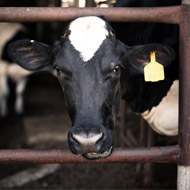Reports of SBV in Wales and west England

After SBV was discovered in dairy cattle herds in Germany during 2011, it spread across Europe (stock photo).
Schmallenberg virus (SBV) has been detected in bulk milk tests from dairy herds in Wales and the west of England in recent weeks, according to reports.
Tom Wright, a large animal veterinary surgeon who works with clients in Cheshire, Shropshire, Staffordshire and north Wales, told Farmers Weekly that over the past month, bulk milk from herds has tested positive for the virus. There have also been some positive blood samples from heifers and lambs.
Mr Wright said the virus was likely circulating in Wales and west England during late summer or early autumn.
Cattle and sheep in the south, south west and east of England are more commonly at highest risk owing to infected midges blowing across the channel from continental Europe.
Independent dairy and beef consultant Hefin Richards told Farmers Weekly there was flying midge activity "well into the autumn" this year and positive Schmallenberg results had been reported in west Wales, Shropshire and Cheshire.
Testing suggested Schmallenberg virus to be the cause of the sporadic scouring and yield drop seen in dairy cows, he explained. Antibodies in bulk milk tests, as well as some blood tests, showed herds have been exposed to Schmallenberg, he added.
SBV is a midge-borne viral disease that causes only mild clinical signs in adult ruminants, including a drop in production (e.g. milk output). In pregnant animals, however, it can lead to abortions, stillbirths and congenital defects.
After it was discovered in dairy cattle herds in Germany during 2011, it spread across Europe. The UK saw high circulation of SBV in 2012-2013, followed by a decline in 2014. It is thought the virus spread to south and east England when infected midges were carried over from continental Europe.
Farmers are advised to be vigilant and report to their vet any signs of the virus, including milk drop, diarrhoea, fever and inappetance in adult ruminants, as well as congenital deformities in newborn animals.



 The Federation of Independent Veterinary Practices (FIVP) has announced a third season of its podcast, Practice Matters.
The Federation of Independent Veterinary Practices (FIVP) has announced a third season of its podcast, Practice Matters.